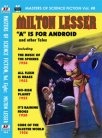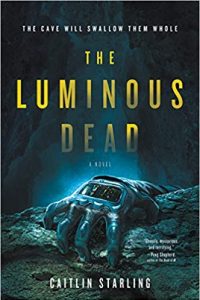Paul Di Filippo reviews Milton Lesser
 If you do not know the enchantingly retro line of SF/F/H books published by Armchair Fiction, under the knowledgeable aegis of founder Greg Luce, who defines his venture as “a labor of love,” then I offer you now an eye-popping introduction. Visit his site and marvel at the vast range of vintage fiction, long out of print, lovingly repackaged with period artwork. Names as seminal as those of Fritz Leiber, Clifford Simak and Edmond Hamilton consort with the bylines of lesser craftsmen who contributed their own idiosyncratic tiles to the grand and glorious mosaic that we dub the fantastika of the twentieth century. The Armchair Fiction catalogue opens an essential window onto a vital and overlooked and still enjoyable portion of our history.
If you do not know the enchantingly retro line of SF/F/H books published by Armchair Fiction, under the knowledgeable aegis of founder Greg Luce, who defines his venture as “a labor of love,” then I offer you now an eye-popping introduction. Visit his site and marvel at the vast range of vintage fiction, long out of print, lovingly repackaged with period artwork. Names as seminal as those of Fritz Leiber, Clifford Simak and Edmond Hamilton consort with the bylines of lesser craftsmen who contributed their own idiosyncratic tiles to the grand and glorious mosaic that we dub the fantastika of the twentieth century. The Armchair Fiction catalogue opens an essential window onto a vital and overlooked and still enjoyable portion of our history.
The latest entry in their “Masters of Science Fiction” series is awarded to Milton Lesser, who bears a name the majority of modern fans will probably be unfamiliar with. Lesser was one of those working-stiff writers back in the day who turned out intelligent, yet perhaps sometimes over facile, goods to suit whatever market was looking for material and paying a decent word rate. No “High Call of Art” here! Over a hundred SF stories and some two dozen longer works, according to this book’s short back cover introduction. (Sadly, exact publication information for each story is missing on this compilation’s copyright page, although easily obtainable at ISFDB.) Then, under the penname Stephen Marlowe, he was responsible for dozens of entertaining mystery novels that still command a following today. But what of his science fiction? Truly the work of a Master? Did it exhibit a genuine affinity for the mode, a sense of wonder, some unique ideation? Does it seem hokey and clunky today, or do its narrative virtues still engage and reward?
The short title story opens the volume with a nice bit of Cold War paranoia along the lines of Jack Finney or even Philip K. Dick. A tax collector for android usage fees uncovers a plot of conquest and ends up an ignored, transformed Cassandra. The action is swift and vivid, the fate of the hero creepy, and the overall impact like a good episode of The Twilight Zone.
Up second, a longer piece, “Voices in the Void,” illustrates Lesser’s virtues. The premises, characters and setting of his tale are introduced concisely and logically, yet with narrative engagement, not as an infodump. The reader inhabits the story instantly, in part thanks to simple, clear yet euphonious prose. And, like so many of his peers, Lesser employs a mix of his own fresh tropes—whispering interstellar voices; the teleportation of water from one planet to another—with lots of shared, off-the-shelf conceptual furniture (planetary miners; avaricious corporate overlords; professional spacers) that allows him to tell his story easily and familiarly without reinventing the wheel every time. The tale also features appealing mystery/noir conceits and attitudes without seeming like a mere transposed mundane adventure.
“The Double Occupation” takes a bizarre notion—inhabiting an alien body in a manner somewhat akin to James Cameron’s Avatar—and uses it to ponder some sophisticated questions. An alien planet, inhabited by sentient “lobster-mantises” who have lost a war, has come under the control of human peace forces. They upload human personalities into representative aliens, producing dual minds in each alien body, then send the “occupied” aliens out as a re-education cadre to civilize the world. Our hero, Ralph Cook, finds himself battling his host mind amidst a debate about the rightness of the human program, and respect for the Other. It’s a thoughtful and thrilling exercise in estrangement.
“No-Risk Planet” and “Code of the Bluster World” work the familiar Robert Sheckley/William Tenn humorous and satirical vein of 1950s SF. While they are not as hilarious as the best of those masters, they do produce some laughs. A more gonzo offering is “It’s Raining Frogs,” which has a Rudy Rucker/Thorne Smith vibe (along with a dose of period sexism manifesting mostly in wives getting spanked by their husbands). Meanwhile, “Music of the Spheres” is of that moralistic mode most familiar from The Day the Earth Stood Still: aliens deliver the wisdom our species needs.
On the other hand, “All Flesh Is Brass,” conjures up a gritty Samuel Fuller war movie, with its grim portrait of American infantry combat with the invading USSR, followed by a military invention spinning out of control. Another 1950s mashup of influences, reflecting the ubiquity of Ernest Hemingway and Ray Bradbury, surfaces in “Anything Your Heart Desires,” wherein a jealousy-plagued safari on Mars encounters powerful remnants of the native technology. Fans of Harlan Ellison’s “How’s the Night Life on Cissalda?” will enjoy a non-erotic version evocatively titled “Black Eyes and the Daily Grind.”
In the homestretch, we encounter two homages: one to Eric Frank Russell, “The Impossible Weapon,” and a riff on Murray Leinster’s “First Contact,” “From Hidden Worlds.” Rather Sturgeonesque, albeit falling far short of the sheer poetry and depth of emotion that Sturgeon always deployed, is “Pen Pal,” concerning a lonely woman looking for romance and her strange suitor. And concluding the volume is “My Sweetheart’s the Man in the Moon,” which satirizes the trivializing power of mass media.
Lesser’s breezy style, his fast-paced pulp plotting, and his penchant for mixing action with intellectual matters in a ratio that favored the former could not conceal his respect for the medium of science fiction, his genuine curiosity and wit, and his ability to deliver a story that met or excelled the professional standards of the day. Reading them not only still confers much pleasure, but also provides an archaeologist’s tranche across the strata of our genre’s history. Armchair Fiction has done well to assemble this latest labor of love.








Great to see an Armchair Fiction book get some media attention. I’ve got a couple of their beautiful books and they are SF and Horror gems. I don’t understand why this series is not more popular.